Gladiator is arguably one of the most impactful films I’ve ever watched. When rumors circulated about a sequel directed by Ridley Scott, it didn’t seem like a great idea, considering the original was already near perfect in its storytelling and didn’t require a follow-up.
Having watched the sequel, which, to put it simply, felt like a cash grab, I now understand what makes the two films so starkly different in quality and how these same principles apply to ones life.
The original Gladiator
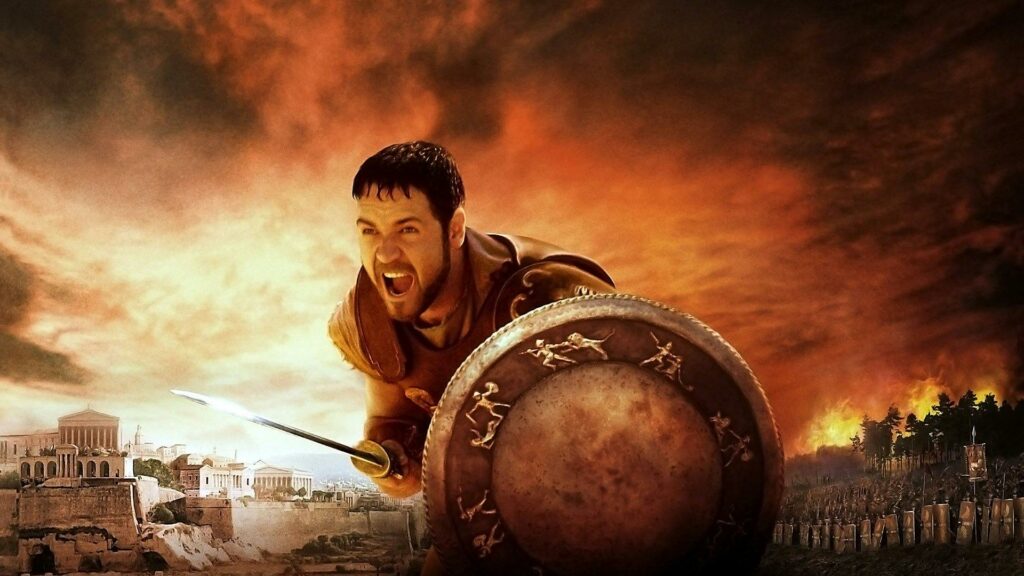
The Story
The story of the original Gladiator mirrors the biblical tale of Abel and Cain in profound ways, using the characters of Maximus and Commodus to embody the archetypes of good and evil, virtue and vice, and the complex interplay of fate and free will.
The tension between Maximus and Commodus mirrors the biblical struggle between good and evil, with Maximus embodying divine justice and Commodus representing moral decay and destruction. Ultimately, just as Cain is punished for his sin, Commodus meets his end at the hands of the very man he sought to destroy. The tragic inevitability of this outcome echoes the biblical message that evil cannot prevail in the face of righteousness.
The characters
Maximus Decimus Meridius
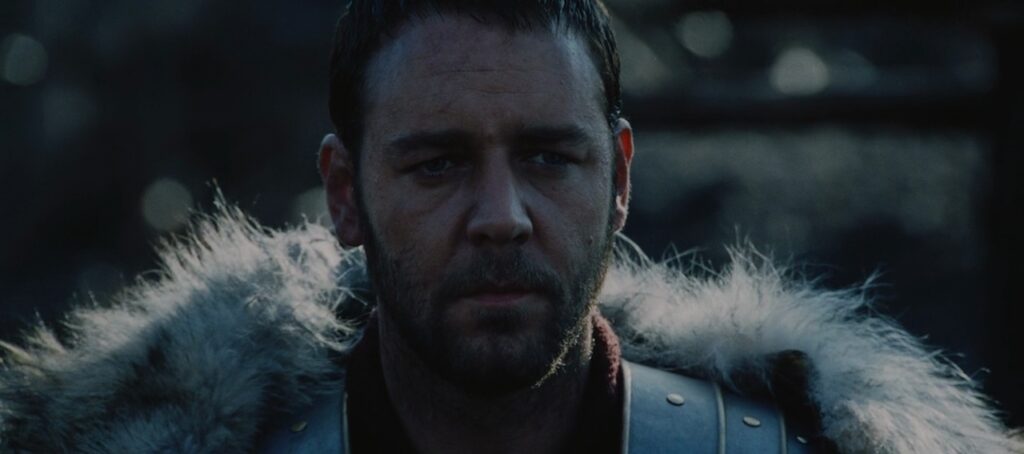
Maximus, much like Abel, is virtuous, humble, and beloved by those around him. His loyalty to Rome and his unwavering commitment to justice and honor set him apart as a man of integrity. His selection by Marcus Aurelius, who chooses him over his own son Commodus, parallels the story of Abel, who is favored by God over his brother Cain. Just as Abel is the righteous one in the eyes of God, Maximus is the one chosen to carry out a higher purpose, to restore balance to the empire, even though it comes at great personal cost.
Commodus
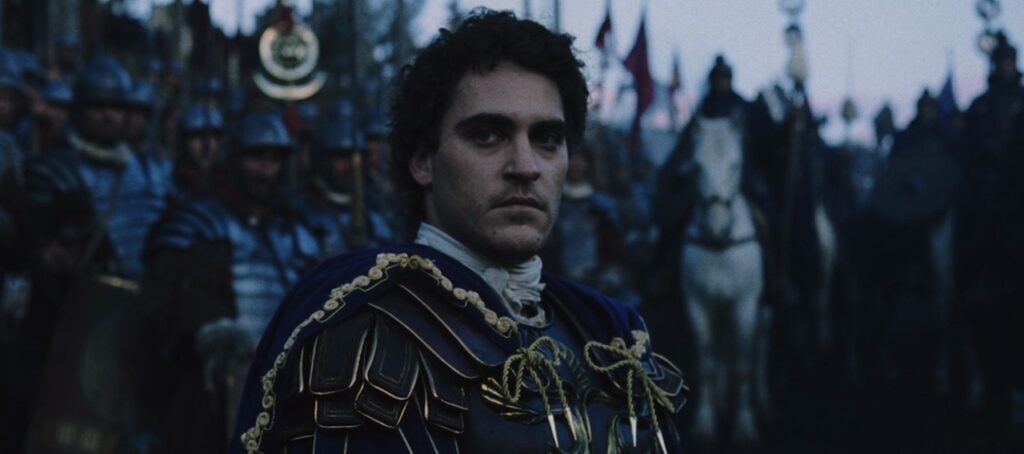
Commodus, on the other hand, represents Cain—driven by jealousy, insecurity, and a deep sense of entitlement. His rejection by his father and his inability to understand the true nature of power and responsibility lead him to a path of corruption, betrayal, and violence. Commodus’ actions throughout the film are motivated by a desperate need to prove himself, to take the throne not out of duty, but out of a desire to elevate himself above others, much like Cain’s violent act to eliminate Abel out of jealousy and his own ideal in the same occasion.
Marcus Aurelius
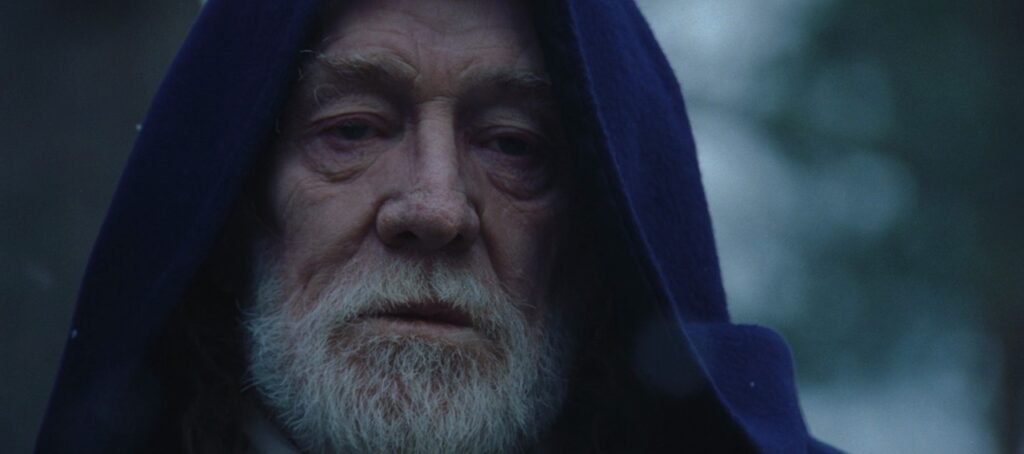
Marcus Aurelius’ decision to choose Maximus over his own son, Commodus, mirrors the biblical story of God’s favoring of Abel over Cain. It is an act of wisdom, recognizing that Maximus embodies the virtues necessary to restore balance and righteousness to Rome, just as Abel is favored for his purity and faithfulness. Marcus’ choice, however, is not without its tragic consequences. His desire to leave behind a legacy of moral leadership and to see Rome governed by someone who prioritizes the empire’s well-being over personal ambition is undermined by the very son he hoped would carry on his legacy.
How is it portrayed on screen?
Maximus Decimus Meridius
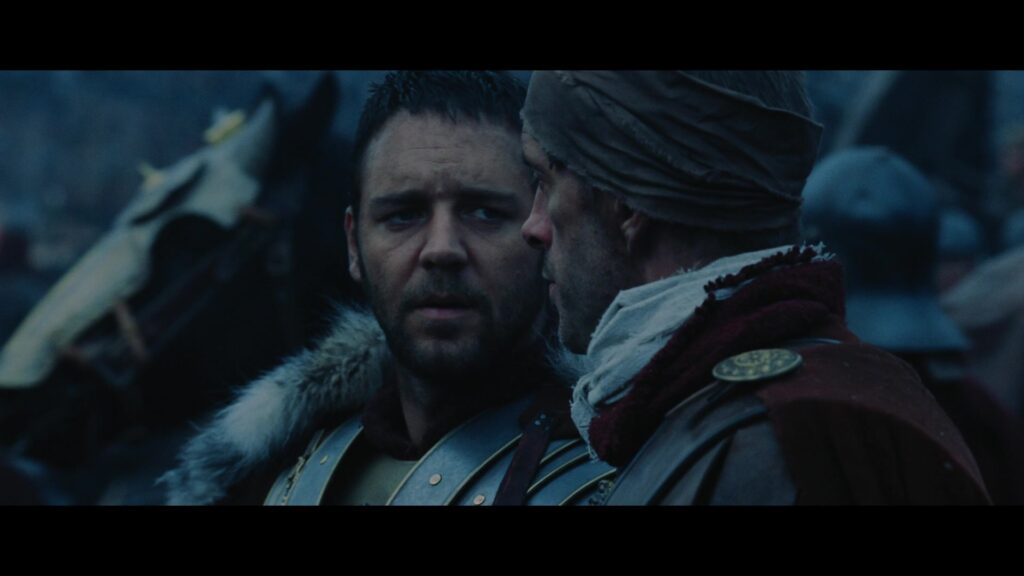
- In the first scene, Maximus gazes at a bird, a subtle smile on his face, reflecting a moment of peace and connection with nature reflecting on his own humanity. The smile fades, replaced by a solemn expression, symbolizing the weight of the responsibilities and sacrifices he must bear to lead his men to victory.
- Maximus enters his battalion, where everyone honors him. He takes the time to shake hands with them, demonstrating that he views himself as equals with his soldiers.
- When he speaks to Quintus about whether they would know if they were on the brink of being conquered, it reveals his understanding that he is no better than his enemies.
- When Maximus delivers his speech to his men, he speaks of his belief in the afterlife, emphasizing that every action in life echoes in eternity. This reflects his commitment to the greater good and his spiritual awareness.
- When Maximus enters battle, he leads his men by example, positioning himself at the front of the cavalry, showing courage. The synchronized progression of the army and their organization in battle demonstrates Maximus’ strategic competence.
- When Maximus meets the politicians from the Senate, he seeks to avoid getting involved in politics, instead emphasizing his identity as a soldier, reminding them he is not interest in holding power.
- Although Lucilla clearly desires Maximus, he remains distant, not out of disrespect, but to avoid any form of flirtation out of respect for his loved ones.
- When Maximus receives the news that Marcus Aurelius wants him to become the leader of Rome, he refuses, once again demonstrating that his humility only desiring a simple life.
- Although, he does not wish to take on this responsibility he is willing to sacrifice for his ideal even letting go of his personal dream for the best interest of Rome.
- After Commodus kills his father, Maximus faces a dilemma: he can either embrace his hand and corruption to save his family or pursue the higher calling of truth and loyalty to Rome’s value, even at the risk of his loved ones.
This defiance leads to the brutal murder of his wife and son, a devastating consequence of his commitment to higher principles. Maximus’ journey is a powerful example of how the pursuit of truth often demands profound personal sacrifices, even when the price is unbearable, highlighting the tension between duty and the personal cost of integrity.
Maximus’ journey is one of profound sacrifice, but in the end, he gains everything he ever wanted, albeit in a way that transcends his original desires. Initially, Maximus seeks vengeance for the brutal loss of his family and the betrayal of Commodus, longing only for justice and the opportunity to reunite with his loved ones in the afterlife. However, as his journey unfolds, his perspective shifts.
Through his actions and sacrifice, Maximus ultimately gains not only personal vengeance but also moral and spiritual victory. His unwavering commitment to honor, duty, and the greater good of Rome inspires those around him, turning him into a symbol of integrity and righteousness. His death, though tragic, solidifies his legacy as a man of virtue, a man who stood for something greater than himself, embodying the ideals of leadership and sacrifice that Marcus Aurelius once hoped for.
In a broader sense, Maximus gains the respect and admiration of his fellow soldiers and the citizens of Rome, fulfilling his final role as a true leader, one who led by example, not by power or ambition. His soul is at peace because he achieved his ultimate goal: to fulfill his purpose and ensure that Rome would be led by someone who would honor his principles.
Maximus’ story shows that true fulfillment comes not from earthly possessions or personal triumphs, but from living in alignment with one’s values and legacy. By seeking justice and righteousness above all, Maximus ultimately attains a lasting victory that transcends his personal desires, making him a hero not just in the eyes of those around him, but in the broader narrative of history. In the end, Maximus gains everything: justice, honor, the love of his comrades, and a place in history as a symbol of virtuous leadership.
Commodus
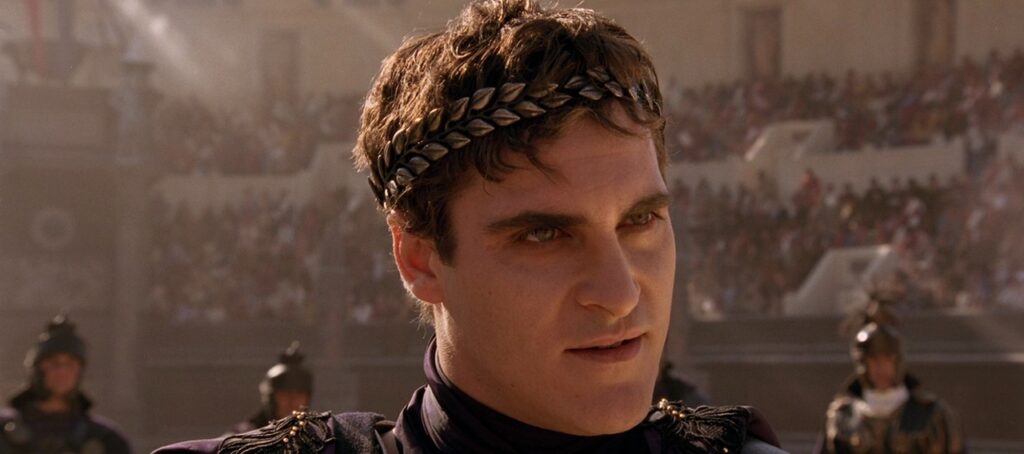
- The first scene featuring Commodus shows him inside a carriage, arriving long after the war has ended, and surrounded by his Praetorian guards for protection.
- Not only does he arrive late, but he also begins discussing his belief that he will be named emperor, while simultaneously flirting with his sister that he secretly desire.
- Upon arriving, despite having contributed nothing to the battle, he immediately takes a commanding stance and demands the sacrifice of 100 bulls to honor his father.
- When his father requests that he honor Maximus, Commodus reluctantly complies, though his jealousy is palpable. In contrast, Maximus demonstrates genuine care for Marcus Aurelius, assisting him onto his horse without any pretense.
- After the battle, when politicians speak with Maximus, Commodus enters the conversation, scheming and adopting the demeanor of a politician.
- When his father reveals his decision, Commodus chooses to kill him, rejecting his father’s wisdom and his beliefs in the higher truth.
By attempting to kill Maximus, Commodus is not just eliminating a rival, but also rejecting the very ideal that his father, Marcus Aurelius, embodied—an ideal rooted in wisdom, virtue, and the greater good of Rome. Maximus represents the qualities that Marcus Aurelius valued, qualities that could have potentially reshaped the empire and solidified its prosperity.
Commodus, driven by pride and a refusal to change, sees Maximus not just as a threat to his personal power but as a symbol of the leadership he is too insecure and incapable of embracing. His desire to maintain control through manipulation and cruelty reveals his inability to rise above his ego and accept the responsibility that would have made him a truly effective leader.
In essence, by trying to destroy Maximus, Commodus is choosing to destroy the very values that could have guided Rome toward a more noble and just future, opting instead for self-indulgence and fear-driven rule.
A comparison with Gladiator II

The Story
“Gladiator 2” follows Lucius Verus Aurelius, the son of Lucilla and nephew to Commodus, as he seeks revenge for his wife’s death. Lucius rises to power, confronting political and military challenges while grappling with his internal conflict between vengeance and the legacy of Maximus’ ideals. The story shifts focus to Lucius’ struggle with ambition, justice, and leadership.
Unlike the original film, which was steeped in divine themes of justice, fate, and the afterlife, “Gladiator 2” deviates from these higher ideals. Lucius’ journey becomes more about political maneuvering and personal revenge, overshadowing the spiritual and moral elements that made the first movie so impactful. This shift turns the story into a more conventional exploration of power, losing the deeper, divine resonance of the original.
The characters
Lucius Verus Aurelius
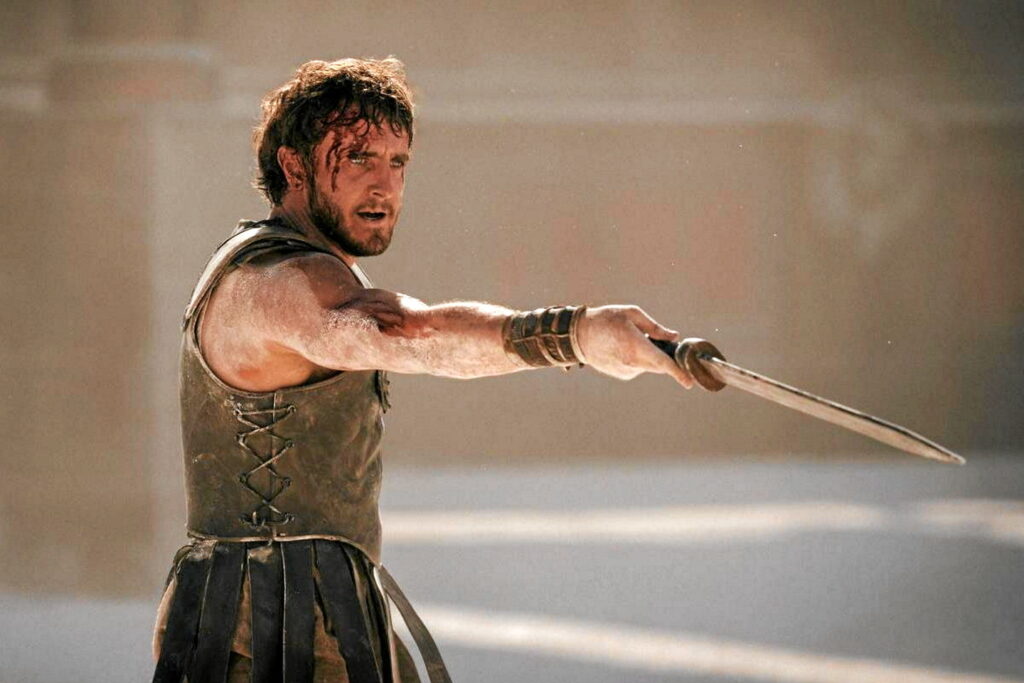
Lucius Verus Aurelius, unlike Maximus, is driven by ambition and revenge rather than inherent virtue. While he is the rightful heir, his path is clouded by the loss of his family and the weight of his legacy. His journey is marked by internal conflict, torn between seeking justice and avoiding the corrupting influence of power. Unlike Maximus, whose rise was guided by a higher purpose, Lucius’ actions are motivated by personal vengeance, as he seeks to avenge his family and restore order in a world defined by betrayal and ambition.
General Acacius
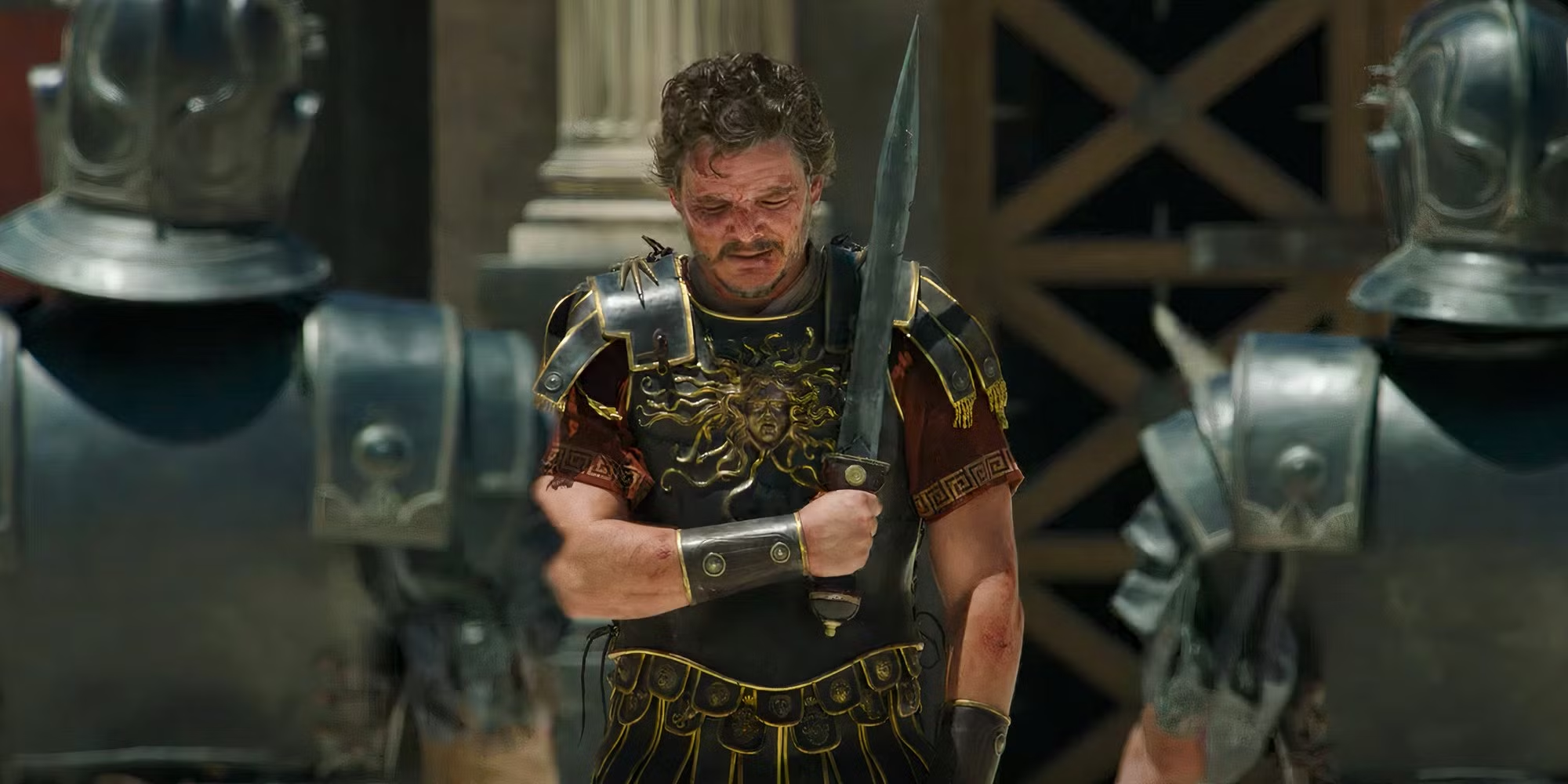
General Acacius is a character defined by his ruthless ambition and cold pragmatism. Unlike Maximus, who fights for honor and the greater good, Acacius is driven by a desire for power and control. He is a conqueror who burns the remains of defeated nations to demonstrate his dominance, showing no regard for the lives or dignity of others. While Maximus leads with integrity, Acacius is manipulative, playing the political game to secure his position, all while secretly despising those in power. His actions reflect the darker side of human nature, where personal gain takes precedence over honor or morality.
Macrinus
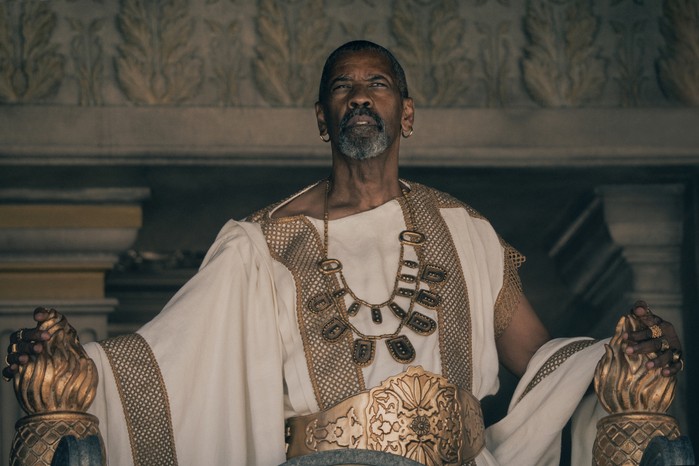
Macrinus is a character consumed by his ambition for power, willing to use manipulation and coercion to achieve his goals. Unlike Maximus, who is motivated by a sense of honor and duty, Macrinus seeks the throne through underhanded tactics, displaying no real moral compass. His actions are self-serving, and he is willing to betray any ally or principle to secure his position. While Maximus is driven by a higher purpose, Macrinus embodies the corruption of power, focused only on his ascent, regardless of the cost to others. His character is a stark contrast to the virtuous figures around him, driven entirely by pride and ambition.
How is it portrayed on screen?
Lucius Verus Aurelius
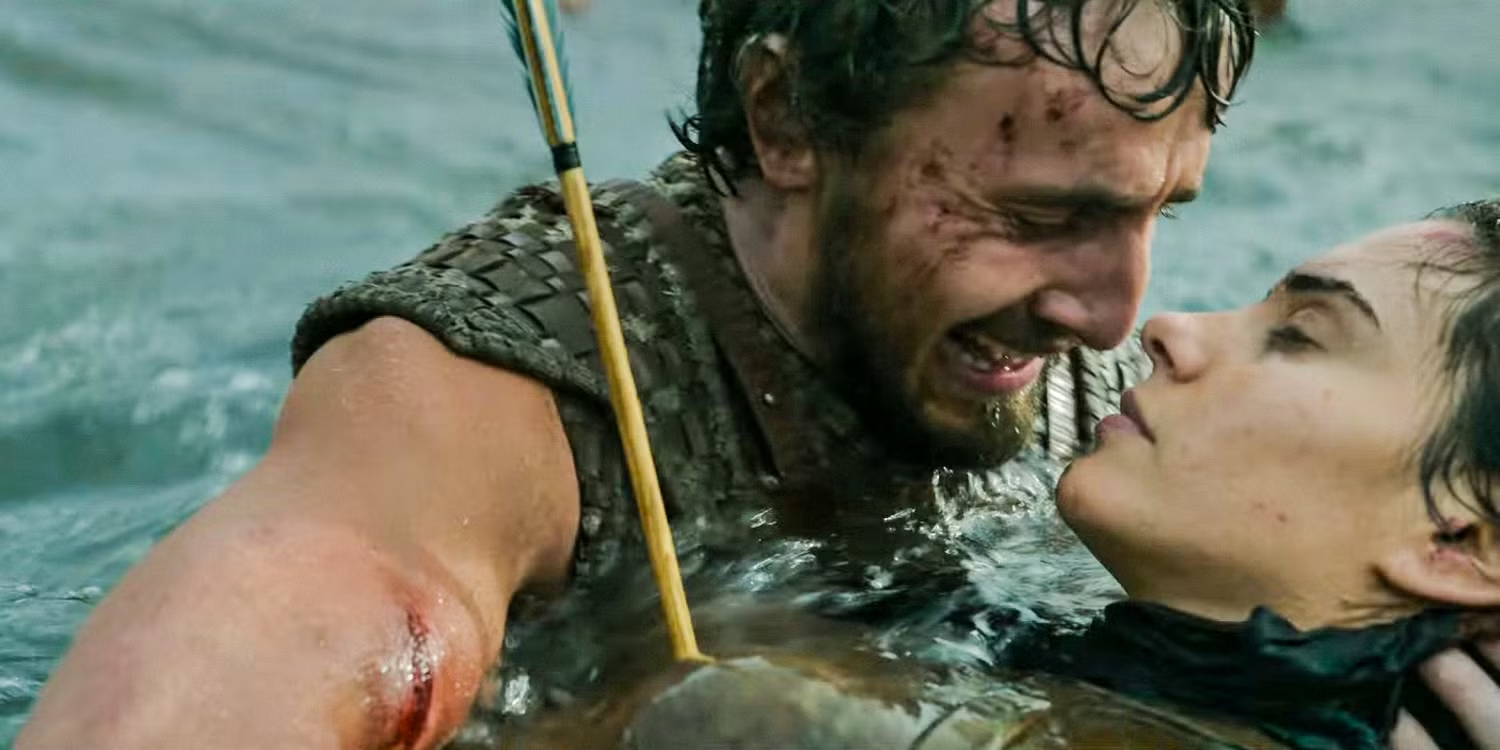
- Once his wife dies, Lucius Verus Aurelius loses his purpose, failing to fight back and allowing himself to be captured by the same men who attacked his land and killed his wife as he watch powerlessly the remaining of this people being burn in front of him.
- Even with no chains and a sword in his hand, standing just a few feet from the twin emperors while the Praetorian guards are distant, he never attempts to kill them, as fighting for a higher purpose is not his battle.
General Acacius
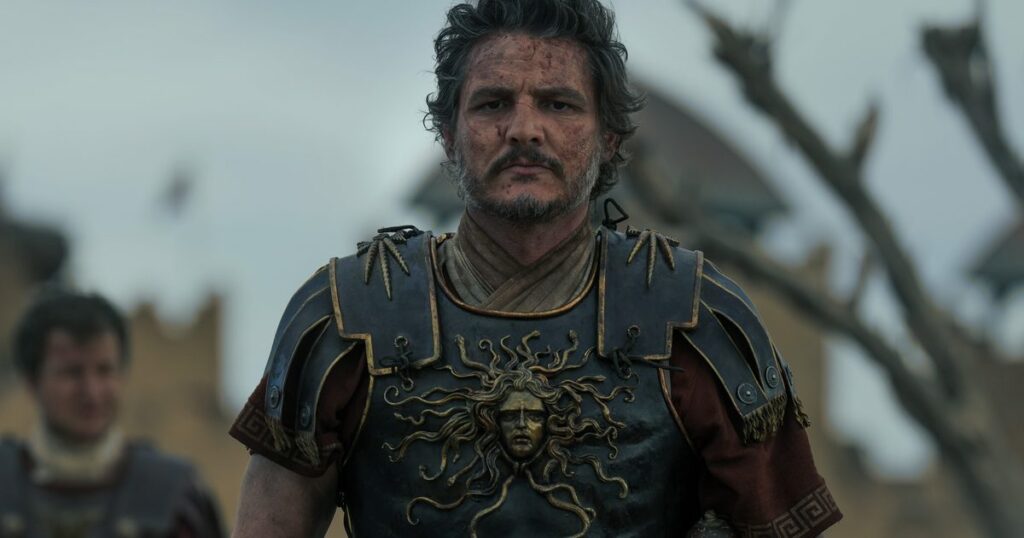
- General Acacius does the complete opposite of Maximus, who rejected deceit and corruption. Acacius smiles and eagerly embracing the emperors’ favor and hands, conquering and killing on their behalf while plotting behind their backs.
- General Acacius is scheming to overthrow the emperors and seize power for himself using Machiavellian tactics with his wife Lucilla.
- In the arena, General Acacius shows no hesitation when fighting what appears to be his own man, striking first with a surprise attack showing a much respect he has for his own men.
- Ultimately, for reasons that are not entirely clear, Acacius refuses to fight Lucius Verus Aurelius. It could be due to Lucius being the son of his wife, or perhaps because Acacius retains a flicker of humanity. However, this aspect of his character remains underdeveloped in the film.
Macrinus
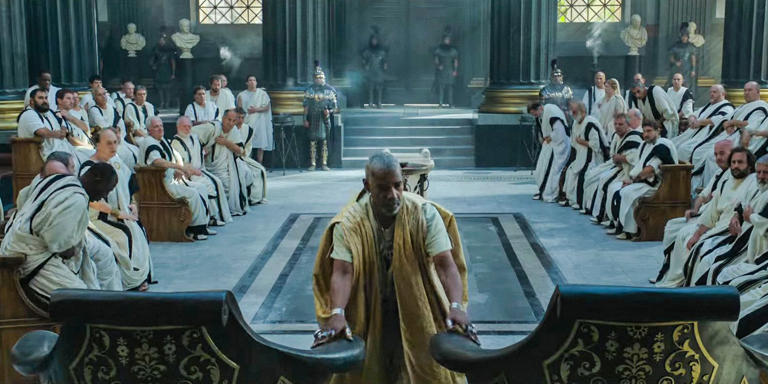
- Macrinus is essentially a counterpart to Proximo from Gladiator, but whereas Proximo’s ambition is grounded in the pursuit of wealth, Macrinus absurdly schemes to seize the throne and become the emperor of Rome.
- Macrinus uses gambling and debt to manipulate politicians, a character reminiscent of Alonzo from Training Day. However, this dynamic feels out of place in ancient Rome, where it’s hard to believe a powerful politician, who makes the rules, would feel compelled to repay a gladiator owner.
- Macrinus uses very obvious, divisive tactics to sow discord between the twins emperor and take control of the weaker one, methods so obvious that even a child could recognize them, risking a potential backlash.
- One of the most ridiculous moments is when Macrinus kills the remaining emperor in front of the Colosseum crowd, doing so without any attempt to remain inconspicuous. While in the first opus Commodus couldn’t even kill Maximus secretly to avoid a revolt.
A few words on Napoléon
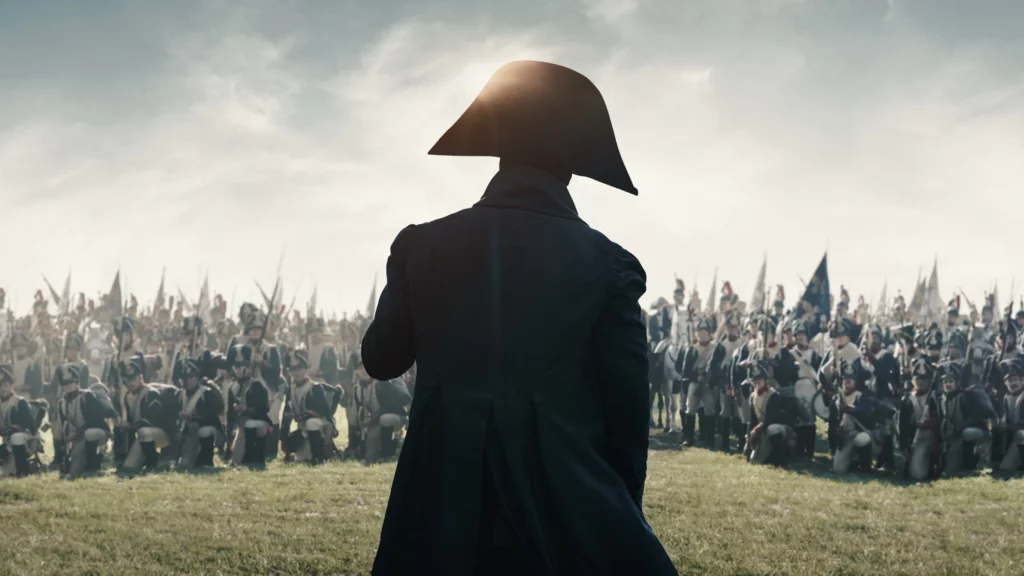
Although I have no concrete proof, I strongly believe that the release of Gladiator II was intended to make up for the financial disappointment tied to Napoleon. In my view, Napoleon was far more compelling and artistically ambitious than the sequel to Gladiator, yet it failed for the same reasons.
Napoleon Bonaparte, one of history’s most powerful figures, rose from humble beginnings to dominate Europe, but his story diverges from the transcendence and divine values often seen in archetypal heroes. His life was driven by ambition, ego, and personal glory rather than the pursuit of higher moral truths or integrity.
Transcendent heroes are typically guided by a higher purpose, embodying virtues like sacrifice, humility, and justice. Napoleon, however, sought power for personal gain, with little focus on serving a greater good. His self-proclamation as Emperor of France highlights his disconnect from spiritual service, as he sought godlike power without evidence of a higher moral calling.
His military campaigns, driven by personal pride and nationalism, resulted in destruction and loss of life, contradicting the respect for human dignity that true transcendence demands. His downfall also shows his failure to embrace humility or recognize the impermanence of power, as he continued to assert his greatness in exile.
In conclusion, Napoleon’s pursuit of personal glory came at the expense of higher ideals, making his story a cautionary tale about unchecked ambition and power without moral or spiritual purpose. Despite a rather realistic interpretation, there was a noticeable gap between the film, reality, and the audience’s expectations, who were hoping for a story with more depth and meaning.
How movies parallel real life?

The meaning we can perceive in films is the same meaning we search for in our lives.
Movies reflect real life by echoing universal themes like struggle, morality, and sacrifice, providing a space for us to reflect on our values and challenges. The hero’s journey often taps into the “divine drama of life,” where personal struggles align with higher purposes, connecting us to something greater than ourselves or the material world.
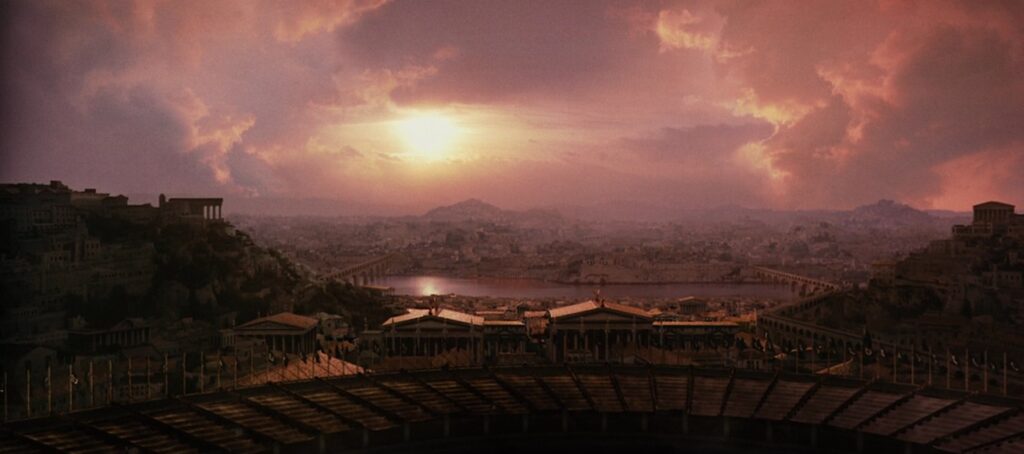
Gladiator exemplifies this deeper struggle, with Maximus fighting not just for vengeance, money or power, but for justice and balance. His unwavering commitment to honor and duty mirrors a higher ideal, reflecting humanity’s eternal inner battle. The film’s themes of moral integrity and self-sacrifice invite reflection on the most meaningful aspects of our own lives.
In contrast, Gladiator 2 lacks this sense of higher purpose or moral depth. It fails to explore significant themes or deeper truths, instead relying on spectacle and power struggles. The characters lack the internal spiritual conflicts that connect them to something greater, leaving the audience with little reflection or meaning. Gladiator 2 highlights how a lack of engagement with life’s spiritual truths results in a hollow film, while Gladiator resonates with universal themes, making every action feel divinely consequential.
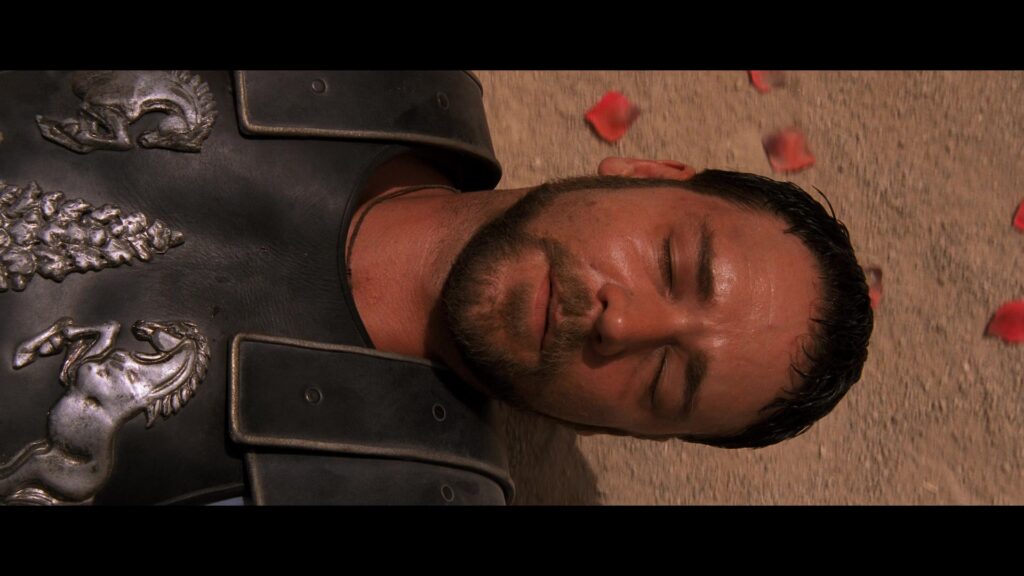
Since movies mirror real life, humans are not meant to simply fulfill survival, material, or power-driven desires. Instead, they seek journeys that help them grow toward a higher form of truth or value. Just as Gladiator 2 fails to engage with its superficial focus, a life focused only on these themes would lack depth and fulfillment. On the other hand, a life directed toward the ultimate truth or something greater than ourselves would bring the same level of echo and sense of engagement to our life as we experience watching the original Gladiator.


GIPHY App Key not set. Please check settings